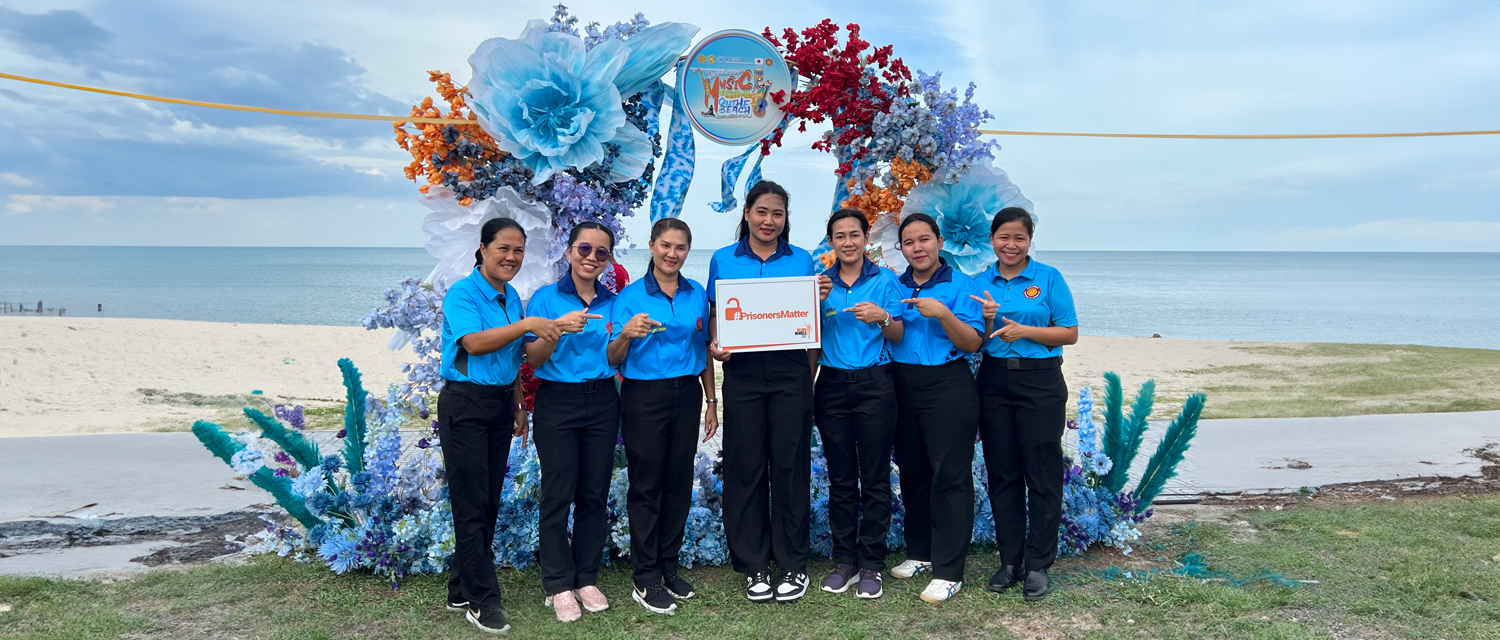
It is early evening on a beach in Songkhla, Southern Thailand. A stage has been set up beside the sea, along with stalls selling souvenirs and seating for more than five hundred people. As the audience slowly fills, there is excitement in the air for the concert that is about to begin.
But this is no ordinary concert: all the performers are prisoners.
Watching in anticipation is Superintendent Mr. Permpol Thiendusit. “Unless absolutely necessary, the prison does not allow prisoners to leave due to the risk of escape,” he says. “I used my reputation as a guarantee to facilitate their opportunity to showcase their talents outside.”
But his belief in the power of music to change the lives of the prisoners in his care has made it worth it. Mr. Permpol Thiendusit says that the concert, which is supported by the United Nations Office on Drugs and Crime, provides prisoners “with skills they may not have acquired outside. Once in prison, the discipline and vocational training can equip them with skills for future employment outside. Most of the people in prisons possess various skills, but sometimes they may not realize their expertise until they explore themselves in prison.”
In his view, though, music can do more than improve prisoners’ future employment prospects. “Music can comfort everyone; it exists globally, transcending language and geography. Even though they experience suffering from a lack of freedom, music can soothe their spirits, allowing them to connect with their peers.”
The concert begins, and the stage fills with performers. A huge group dressed in collared shirts and long pants, with short sarongs called ‘songket’ wrapped around their waists, drums and sings with infectious energy. Next, the performers showcase their dance moves, followed by a dance-fighting display and a captivating performance of the Rong Ngeng dance.
The audience watches in rapt attention – but some faces are more intent than others. Khun Panya* is one of them as he watches his son perform.
“Our whole family came to support—grandmother, mother, child, and aunts. I haven't seen my child for many years—it's been seven years now. This event allowed my child to visit me, and for our relatives to be close to him as well. Today, I got to hold my child and be close to him.”
Khun Panya has been struck by the change he has seen in his son since his imprisonment. “Back then, he never participated in any activities. But once he was in prison, he received vocational training, which could help him find a job once he is released. Performing music helps him to become less aggressive and avoid negative influences too… As a father, I am very happy and proud.”

While in other prisons the musical talents of prisoners might remain contained behind bars, Mr. Permpol Thiendusit was keen to see them showcase their talents – for family members, but also for the general public.
“We hope society recognizes that we should offer opportunities for those who have erred and are released. They are like anyone else; they just made mistakes and ended up within the system.”
As audience members take photos holding up signs that read ‘#PrisonersMatter’, it seems the concert might have achieved just that.
Nong Da* came to the concert with her friends after finishing a day at university. “The atmosphere is very chill,” she says, smiling. “Attending the concert today made me realize that we should give these individuals a chance to reintegrate into society and start anew. If we don't give them a chance or if society rejects them, they might fall back into old habits and end up in prison again.”
She pauses to reflect. “I feel a deep understanding for the prisoners.”
As day turns into night, the style of music changes. Prisoners wearing tuxedos croon into microphones, while others in their prison uniforms rap, strutting across the stage and engaging the crowd. Some women performers, adorned with headscarves and dressed in long Malay-style muslin or lace garments paired with batik or woven sarongs, join the group performance of the Manora dance.
The performers’ smiles beam out at the audience and one thing is clear: these people have talent.
One key member of the audience is Mr. Yusin Jintapakorn, Vice Minister for the Ministry of Justice. His support offers hope that there will be more events of this kind in future. “I am fully committed to supporting our prisoners in developing their potential and self-worth, so they can become proficient in their areas of interest,” he says. “I believe that the music event will achieve its objectives, captivate and impress the attendees, and pave the way for the acceptance of prisoners back into society with happiness.”
Mr. Permpol Thiendusit has big plans for the future. “I aspire to establish a theatre in the future to allow prisoners to develop performance skills, which could eventually connect them to the service sector. This group will have a space to express their talents, potentially expanding to places like Phuket or attracting tourists from Malaysia.”
Khun Panya’s dreams lie closer to home. “My son is my only child. So, for me, it's enough if he comes out of prison and becomes a good person.”
______________________________________________
*Names changed
The way we treat prisoners is key in making our communities safer and protecting human rights for all. UNODC works with over 50 Member States worldwide to advance non-custodial measures, improve prison management and conditions, and support social reintegration. Find out more.
With thanks to the Department of Corrections in Thailand and Songkhla province for their collaboration, and our donor the Government of Japan.